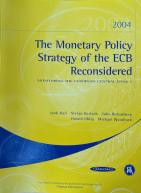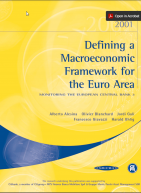Monitoring the European Central Bank
MECB 6: Transparency and Governance
Even though the general orientation of policy has been faultless, the ECB is still trailing behind state-of-the-art transparency. Previous MECB Reports have already pointed this out and some progress has been achieved but more remains to be done. At a time when euro area inflation expectations are ringing alarm bells, ECB credibility is sliding down. Since late 2005 the ECB has removed its highly accommodative stance, but inflation could have been lower even with the same path of interest rate decisions had not financial markets taken a long time to understand its aim. With the policy rate now close to �neutral�, financial markets face greater uncertainty about the next policy move, including its direction. This shows how important it is for the public to understand the reasoning behind the ECB�s policy decisions.
In a democracy, central bank independence must be constantly defended and the only defence is popular support. This is why central bankers must account for their decisions and why they cannot ignore public opinion. Support can be eroded by determined politicians, as evidenced by the declining trust in the ECB among French citizens. Such a development may tempt more politicians to earn popular support by criticizing the ECB and the repetition of largely misguided attacks may succeed in denting the reputation of the central bank. It should not be so. The solution is better communication, and not just toward the financial markets. Communication, in turn, must rest on a clear strategy and a high degree of transparency.
The way the Governing Council makes its interest rate decisions remains clouded. It should publish voting records. By allowing the public to weigh its members� evolving views, the balance of votes leads to a better understanding of how the Governing Council responds to economic information. The ECB claims that its monetary policy decisions are always consensual and that voting records are useless. Consensus is a vague concept and the ECB has encouraged the interpretation that consensus amounts to unanimity. Our analysis of the voting pattern of other central banks strongly suggests that it is simply incredible.
Communication is not just about accountability and public support, it also directly affects policy effectiveness, which depends on the central bank�s ability to shape expectations. The ECB does help markets anticipate its next decision, but this is not enough. Markets care much more about the future course of action. Indeed, this is probably the single most frequently asked question at press conferences or other events. In response, the ECB has developed a complex system of code words, forcing central bank watchers to develop considerable linguistic skills. Code-word communication is often seen as a good way of not getting boxed in and of avoiding the need to reach agreement in the policy-making committee. But the downside of code words is that they may be misinterpreted and that their very imprecision reduces the effectiveness of monetary policy while they do not fully remove the (wrong) impression of pre-commitment. This is why the ECB should publish its anticipated interest rate path, as several central banks have started to do.
Setting monetary policy and explaining it to the public are difficult tasks that constitute a full-time job. Managerial responsibilities are distractions that reduce the effectiveness of board members in carrying out the task for which they have been selected. The internal organization of the bank should be reconsidered, separating the role of Executive Board members from the responsibilities of running the Bank. Managerial tasks should be delegated to the Bank�s managers, possibly supervised by a general manager. Responsibility for overseeing current business should be limited to the President and the Vice-President. An added benefit is that it would make it harder for politicians not to appoint the best monetary experts.
Meetings should be less frequent. Moving to the FOMC six-week frequency could help extend the time the Council dedicates to monetary policy decisions. Participation in the meetings dedicated to technical issues could be delegated to national central bank deputies, or organized by conference calls.


